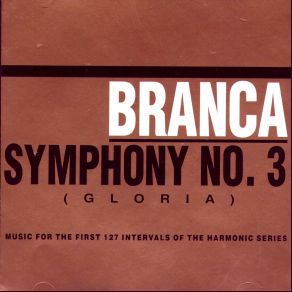Symphony No. 3 (Gloria)
Download links and information about Symphony No. 3 (Gloria) by Glenn Branca. This album was released in 1983 and it belongs to New Age, Rock, Classical genres. It contains 3 tracks with total duration of 45:31 minutes.

|
|
|---|---|
| Artist: | Glenn Branca |
| Release date: | 1983 |
| Genre: | New Age, Rock, Classical |
| Tracks: | 3 |
| Duration: | 45:31 |
| Buy it NOW at: | |
| Buy on iTunes $9.99 | |
| Buy on Amazon $7.99 | |
| Buy on iTunes $9.99 | |
Tracks
[Edit]| No. | Title | Length |
|---|---|---|
| 1. | Symphony No. 3 - Gloria - First Movement | 22:19 |
| 2. | Symphony No. 3 - Gloria - Second Movement | 18:10 |
| 3. | Symphony No. 3 - Gloria - Third Movement | 5:02 |
Details
[Edit]Branca subtitled this work as "music for the first 127 intervals of the harmonic series," and one can certainly sense a more arcane, less overtly rockish approach here than on previous releases such as The Ascension. This may also be due to the fact that, by this time, his musicians were for the most part no longer utilizing traditional (though retuned) electric guitars. Instead, homemade instruments had been created, wherein guitar strings and pickups were attached to two-by-fours that were laid in banks horizontally and played with small sticks or mallets. In performance, one interesting effect of this technique was that, through amplification, an enormous volume of sound was capable of being produced by very slight and gentle tapping of the strings.
Symphony No. 3 begins with airy, sustained chords, making their way in calm fashion through the harmonic series Branca described. They are allowed to simply hang in time — each complex, each very beautiful on its own. After about ten minutes, high bell-like tones are introduced, the initial chords now serving as a solid ground for additional activities. Soon (one might say, inevitably), Stefan Wischerth's drums begin pounding out an insistent tattoo that evolves into a full-fledged, driving rock rhythm. As opposed to earlier works, however, the guitars maintain their cloudy harmonic attack and the result is a splendid tension. The third quarter of the composition involves the interplay of harsher, slashing chords with more turbulent and unfixed rhythms, and sets the stage beautifully for the closing section. Here, Branca returns somewhat to the form of the opening moments, but the chords now possess a dramatic respiratory quality as though the guitar orchestra itself is deeply breathing in and out. The effect is quite beautiful and brings a reflective close to one of Branca's more introspective works.